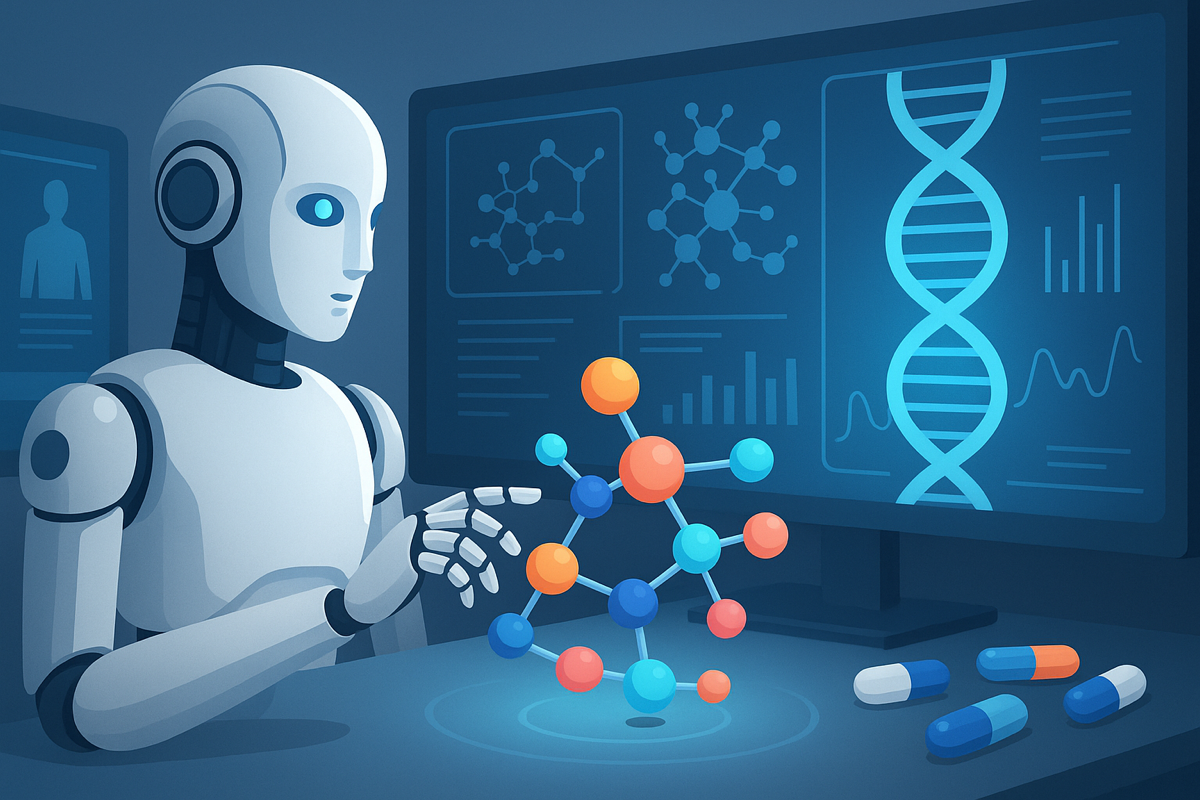AI in drug development represents a paradigm-shifting solution to drugmakers increasingly under pressure to bring therapies to market faster and at lower costs. Artificial intelligence is also cutting the time and expense of bringing a drug to market. This is being done by optimizing compound discovery, accelerating clinical trial design, and improving predictive outcomes. In this article, we examine how AI is not merely changing R&D but also revolutionizing the marketing strategies surrounding pharmaceutical innovation.
The Bottleneck in Traditional Drug Development
Pharmaceutical development has always been a daunting challenge: costly R&D, long timelines (usually more than a decade), and high failure rates, especially in clinical trials. These impediments have significantly hindered the swift and cost-effective delivery of life-saving drugs to market. Despite significant investment, the industry is still burdened with inefficiencies that delay development and increase costs, making innovation both necessary and critical.
This pressure highlights the critical role of AI in drug discovery.
AI in Compound Discovery: Accelerating the First Step
Identification of successful compounds is the cornerstone of pharma R&D. Traditionally, this phase relied on trial-and-error testing, draining company time and resources. Today, AI-based platforms allow scientists to:
- Test enormous libraries of chemicals within minutes
- Predict the behavior of molecules before they are tested preclinically
- Uncover target-disease relationships using natural language processing (NLP)
Next-generation platforms like DeepMind’s AlphaFold have transformed the ability of scientists to predict protein structures with unparalleled accuracy. Similarly, Insilico Medicine’s PandaOmics enables AI-driven target identification from omics information, making researchers’ work easier to accelerate early-stage discovery.
Timelines that took years are now being reduced to months using these technologies.
Predictive Modeling: Reducing Trial Failures
AI goes beyond compound identification. Predictive modeling is now changing clinical trial design and conduct as well. Machine learning algorithms can:
- Locate optimal patient populations
- Predict potential adverse reactions
- Model trial results from real-world and historical data
A Nature Reviews Drug Discovery study demonstrates how AI-driven trial design can boost clinical success rates during Phase 1 trials from 40% to at least 80%, reducing costs and time-to-market by a significant amount.
This shift is particularly valuable in therapeutic segments such as oncology and rare diseases, where conventional trial designs struggle to enroll or yield definitive information.

Artificial intelligence is revolutionizing drug development, from accelerating compound discovery to reducing clinical trial failures. Credit: ChatGPT, OpenAI.
Actual Case Examples: AI in Action
Some pharma and biotechs are already utilizing AI to gain speed on time-to-market:
- Pfizer and IBM Watson have partnered to expedite immuno-oncology research using AI-powered literature and biomarker examination.
- Exscientia designed an AI-designed molecule, DSP-1181, which entered human trials within less than 12 months—a process that would traditionally take 4–6 years.
- GSK integrated AI to read genetic data sets and match them against the correct compounds, boosting discovery success and R&D productivity.
Each of these illustrates how drug development with AI is making a measurable difference across the pharma value chain.
Implications for Healthcare Marketers
As drug development science evolves, so will the strategies marketers use to communicate innovation. For marketers in the life sciences, growing utilization of AI holds several opportunities:
Faster Product Launches
AI is reducing traditional lead times. Marketers will need to begin planning earlier, coordinating branding, education, and positioning strategies well ahead of ultimate regulatory approval.
Data-Driven Positioning
AI-driven development creates an abundance of actionable insights. Marketing teams can use these insights to create evidence-backed messaging that conveys strong clinical differentiation.
Personalization of the Audience
AI allows segmentation by micro-segments based on behavior data and treatment interest. Marketers can use this data to personalize HCP and patient messaging on platforms and at stages of the funnel.
Increased Regulatory Scrutiny
Regulators are beginning to examine AI-led development and trial practices. Marketers must anticipate legal and compliance teams to ensure materials meet current FDA requirements.
By keeping in step with R&D teams, marketers can transcend the role of communicator and become strategic partners, contributing to the success of AI-led therapies from pipeline to post-launch.
EsperienzaRx: A Trusted Partner for Navigating the AI Evolution
At EsperienzaRx, we witness the seismic change that AI in drug development is bringing to the entire pharma life cycle, starting from pipeline planning to marketing activation. Our experts are committed to keeping healthcare brands in the lead by introducing sophisticated innovation into compelling, compliant storytelling that connects. Whether you’re preparing for a faster launch or shifting your marketing approach to stay abreast of developments in science, EsperienzaRx offers the strategic expertise you need to succeed in a more dynamic environment.
AI is driving today’s source of competition within the pharmaceutical industry. From shortening development cycles to reducing failure rates in trials, the presence of AI in drug development cannot be overlooked. To forward-thinking marketers, this new direction presents a strategic imperative to align with innovation, drive performance, and create a smarter approach to commercialization.
Frequently Asked Questions (FAQs)
How is AI helping pharmaceutical companies reduce drug development time?
AI accelerates drug development by streamlining compound discovery, optimizing clinical trial design, and predicting trial outcomes. These efficiencies can shorten development cycles from years to months, helping companies bring new therapies to market faster.
Can AI improve success rates in clinical trials?
Yes. By using predictive modeling and machine learning, AI can identify ideal patient cohorts, forecast side effects, and simulate trial outcomes. This reduces failure rates and enhances decision-making during drug development.
What are some real-world examples of AI in drug development?
Companies like Pfizer, GSK, and Exscientia have used AI platforms to identify drug targets, speed up molecule design, and improve clinical predictions. For instance, Exscientia brought an AI-designed drug to human trials in under a year.
Why should healthcare marketers pay attention to AI in drug development?
AI is shortening time-to-market, which means marketing strategies need to be developed earlier. It also enables more data-driven, personalized messaging for HCP and patient audiences, offering a competitive edge in launch readiness.